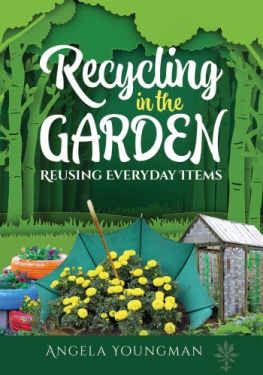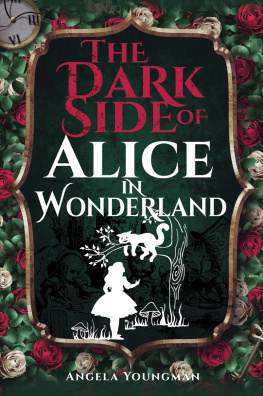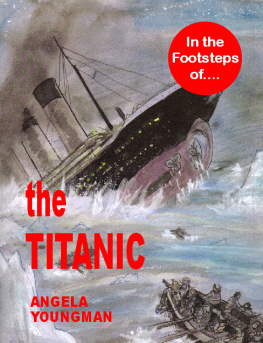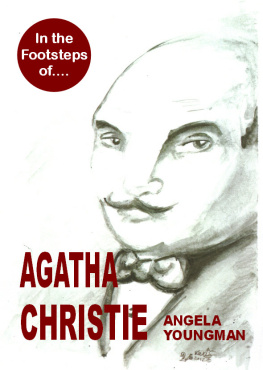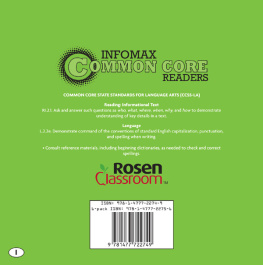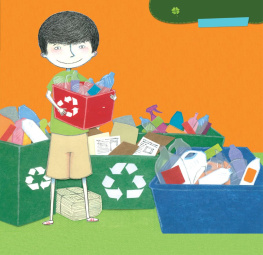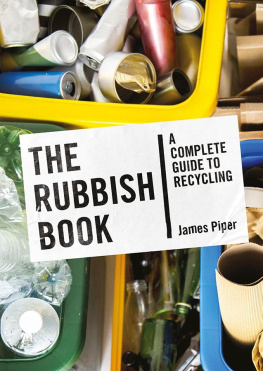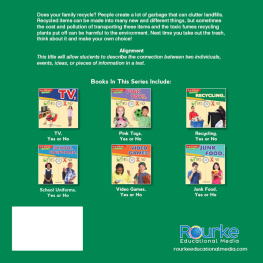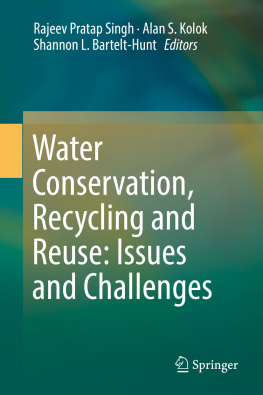RECYCLING IN THE
GARDEN
RECYCLING IN THE
GARDEN
ANGELA YOUNGMAN
First published in Great Britain in 2022 by
White Owl
An imprint of
Pen & Sword Books Ltd
Yorkshire - Philadelphia
Copyright Angela Youngman, 2022
ISBN 978 1 39900 183 0
EPUB ISBN 978 1 39900 184 7
The right of Angela Youngman to be identified as Author of this work has been asserted by her in accordance with the Copyright, Designs and Patents Act 1988.
A CIP catalogue record for this book is available from the British Library.
All rights reserved. No part of this book may be reproduced or transmitted in any form or by any means, electronic or mechanical including photocopying, recording or by any information storage and retrieval system, without permission from the Publisher in writing.
Pen & Sword Books Ltd incorporates the imprints of Pen & Sword Books Archaeology, Atlas, Aviation, Battleground, Discovery, Family History, History, Maritime, Military, Naval, Politics, Railways, Select, Transport, True Crime, Fiction, Frontline Books, Leo Cooper, Praetorian Press, Seaforth Publishing, Wharncliffe and White Owl.
For a complete list of Pen & Sword titles please contact
PEN & SWORD BOOKS LIMITED
47 Church Street, Barnsley, South Yorkshire, S70 2AS, England
E-mail:
Website: www.pen-and-sword.co.uk
or
PEN AND SWORD BOOKS
1950 Lawrence Rd, Havertown, PA 19083, USA
E-mail:
Website: www.penandswordbooks.com
Contents
Introduction
T he world is changing. People are becoming more aware of the environment and their impact on it. Over the past decades we have become an increasingly consumerist society. From a world in which recycling was common, single use became the norm. A throwaway society has developed, covering everything from food to electronics. New was always regarded as being better than old, and throwing away rather than repair has become a normal part of life. People are buying more and more new products, disposing of ever greater quantities of unwanted or broken merchandise, and using raw materials at a rate never before experienced. This situation has become unsustainable, with environmentalists and scientists drawing attention to the finite nature of many natural resources, together with the impact of climate change and its implications for the environment, lifestyle and gardens.
The burning of fossil fuels to provide power and heat has led to increasingly high levels of greenhouse gases trapping the suns energy and making the earth much hotter. As a result, extreme weather conditions such as heavy snowfalls, storms, floods, heatwaves and droughts are becoming more and more common.
Demand for all types of energy has rocketed worldwide. In 2019, Statistica.com reported that global demand for crude oil amounted to 100.1 billion barrels daily, while the discovery rate of new oil resources amounted to just 12.2 billion barrels annually. Compare this to the situation in 1955, when the world was using 4 billion barrels of oil annually and discovering around 30 billion barrels of new crude oil resources. Such excessive use is not limited to oil a similar situation can be found with regard to all types of resources.
Peat is a typical example of unsustainable extraction of raw materials. It is one of the most popular growing mediums used by gardeners, but it is using a material that can never be replaced. The Plantlife website states:
Peat is plant material which is partially decomposed and has accumulated in waterlogged conditions. Peat lands include moors, bogs and fens, as well as some farmed land. Peat bogs grow slowly, accumulating around 0.5 to 1mm of peat each year, and the water prevents the plants from decomposing. Many areas of UK peat bog have been accumulating gradually for as much as 10,000 years, and can be up to 10m deep. Due to its slow accumulation, peat is often classified as a fossil fuel.

Peat, a finite material being dug from the soil.
Commercial peat extraction together with increasing use of drainage to provide agricultural land has destroyed the unique eco-systems within peat bogs that existed for centuries and enabled them to act as carbon dioxide reservoirs, thus significantly contributing to climate change. The National Trust points out:
Peat holds more carbon than the combined forests of Britain, France and Germany. It holds up to 20 times its own weight in water. Dry peat releases carbon dioxide and is one of the biggest sources of greenhouse gas.
Gardening is by far one of the biggest users of peat. Plantlife say that amateur gardeners are responsible for the use of 3 billion litres of peat every year, accounting for 69% of peat compost used in the UK. A total of 32% of that peat is sourced from the UK, 60% from Ireland and 8% from Europe. Commercial extraction can remove more than 500 years of growth within just one year. It also adds to the problem of climate change because when peat is mixed with soil and exposed to aerobic conditions, it begins to decompose, releasing carbon dioxide into the atmosphere and thus further contributing to the greenhouse effect.
Garden Organic is one of many gardening organisations that campaigns against the use of peat in potting composts, pointing out that 95% of the UKs peat bogs have already been destroyed and that much of the peat-based potting mixes available are now being sourced from worldwide sources. Peat-free composts are available, and can prove much more successful than peat-based variations. The Royal Horticultural Society has shown that peat-free gardening is viable, as its gardens are now 97% peat free and it is committed to reducing peat use wherever possible.
The campaign against peat use is just one aspect of the reawakening of the waste not, want not mentality, which had once been a dominant feature of society. Recycling and repair has been regarded as an important facet of human life for many centuries, with earlier societies throwing away as little as possible. In the modern world, recycling is increasingly important since it reduces the amount of waste being sent to landfill and reduces problems caused by pollution. By opting to recycle materials it reduces the need for extracting and processing raw materials, as well as reducing greenhouse gas emissions since less energy is required in the production process. In this changing world, gardeners are very much at the forefront of the recycling and reuse movement, which covers every aspect of gardening techniques and practices including water, energy and materials.
Recycling and reusing is good for the environment and makes financial sense, saving money and time. Think before you buy or throw something away is it worth it? Is there too much packaging involved? Is there a greener alternative? Can items be recycled or upcycled into something totally different?
Natural Recycling
N atural recycling has always been a key element within every garden, although perhaps not automatically recognised as such. Often described as sustainable gardening, it results in the creation of an environmentally friendly area in which natural predators thrive and soils are naturally replenished.
Tailoring gardens to suit the environment, using plants that match the soil and climate, is crucial to the success of natural recycling sustainable practices. Instead of trying to impose a particular garden style such as a dry, Mediterranean or plant ericaceous species in areas with unsuitable soil, a sustainable garden could be more easily created by matching the plants to the soil. This avoids having to spend a lot of time and effort trying to alter the composition of the soil and the environment, using materials such as gravel and peat that may have been transported long distances or that involve the use of non-renewable resources.
Next page
